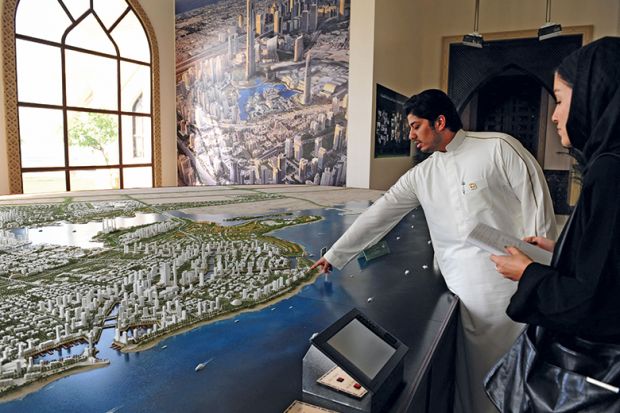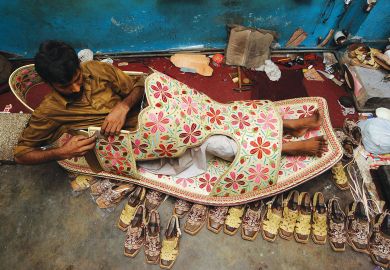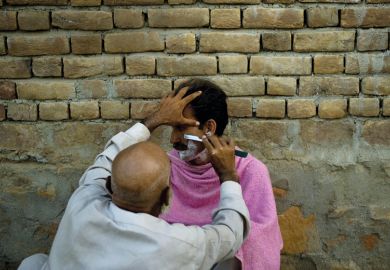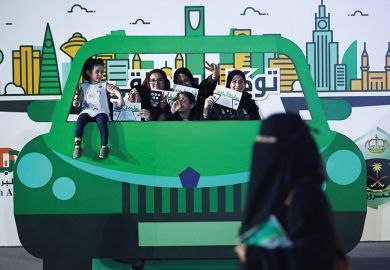Facing an exodus of workers overseas, and with a creaking economy that relies on the cash they send home, Pakistan has hit on an unlikely ruse: asking Saudi Arabia to build a university for would-be expats.
Under the plan, proposed in ongoing talks about employment opportunities in the kingdom, Saudi Arabia would establish a “state-of-the-art skill university” in Pakistan, allowing the two nations to collaborate “in the training of Pakistani workers to meet the rising needs of the Saudi labour market and enhance their skills and capabilities”, the Islamabad government has said.
There are more than 2 million Pakistanis working in Saudi Arabia currently, but the majority of them are in low-skilled occupations.
Improving the employment prospects of the expats could have a significant impact on Pakistan’s economy, which is battling rising unemployment. Saudi-based workers are already the largest contributors to remittance inflows, worth more than £400 million a month, and many Pakistani families are solely reliant on wages sent home by relatives working overseas.
“We have a huge supply of young people who should be working, but the economy is too small to absorb them,” said Ayesha Razzaque, deputy chief of party at the Higher Education System Strengthening Activity programme, a partnership between the US and Pakistani governments.
“In principle, if the Saudis are providing support for a university in Pakistan with a pipeline to employment for its graduates, then this is exactly what all other universities are struggling to do with mostly poor levels of success.”
“We train the people and we don’t provide them with opportunities to work,” acknowledged Muhammad Mukhtar, founding vice-chancellor of Islamabad’s National Skills University, who said that the additional remittances that could accrue from the project would be widely welcomed.
However, while Pakistan is pressing Saudi Arabia to invest more in its people – hoping this will provide a sorely needed economic boost – it remains unclear how keen the kingdom is to train workers from overseas, as opposed to recruiting low-skilled migrants.
Dr Mukhtar said his institution had been in talks with Saudi Arabia for more than a year about establishing a training centre within the university.
“I don’t know whether this is the same proposal being revived or [if] there is something new coming in,” he told Times Higher Education, adding that it was “more feasible” to set up a centre within an established university than to launch a completely new institution.
Annalisa Pavan, an expert on Saudi higher education, said she was sceptical that the kingdom would look to Pakistan for highly skilled labour. Although Riyadh needed foreign workers for mega-projects such as Neom, a futuristic smart city on the banks of the Red Sea, she said, it was largely looking for low-paid, unskilled employees for construction activities and was likely to turn to other countries for expertise in areas such as artificial intelligence.
“This is economics; this has nothing to do with education,” Dr Pavan said of the proposed university. She did note, however, that Saudi Arabia had historically offered scholarships to Pakistani students to study at its own universities, with 700 fully-funded places available last year.
“They could educate and train Pakistanis in Saudi Arabia, as they have been doing for decades, without creating or pretending to create this ‘state-of-the-art’ university,” Dr Pavan said.
Dr Razzaque said that any investment Saudi Arabia did make in the Pakistani sector must be sustainable. “Higher education funding is drying up quickly and we cannot afford yet another white elephant,” she said.
Register to continue
Why register?
- Registration is free and only takes a moment
- Once registered, you can read 3 articles a month
- Sign up for our newsletter
Subscribe
Or subscribe for unlimited access to:
- Unlimited access to news, views, insights & reviews
- Digital editions
- Digital access to THE’s university and college rankings analysis
Already registered or a current subscriber? Login








